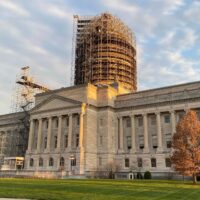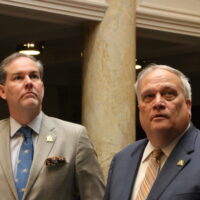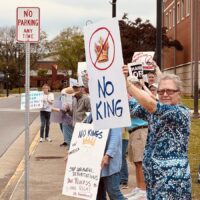The Kentucky House of Representatives has voted to re-legalize historical horse racing, a slot-machine-style of gambling that was struck down by the state Supreme Court last year.
The horse industry rallied around Senate Bill 120, saying parlors filled with the slot-like machines have buoyed racetracks and revenue has trickled down to trainers, breeders and farms.
Rep. Matthew Koch, a Republican from Paris, said historical horse racing, or HHR, has been a shot in the arm for the industry.
“HHR has allowed our industry to expand and grow our purses by 102% in 10 years,” Koch said. “That’s helping the little guys. That’s going to the guys like my family that have been in this for generations.”
Kentucky only allows three forms of gambling — lottery, charitable gaming like church bingo, and pari-mutuel wagering, the form most commonly used to bet on horse races.
Historical horse racing machines function and look like slot machines, but have been allowed to operate for more than ten years in Kentucky because they base results on previously-run horse races.
But last year, the Kentucky Supreme Court ruled that many of the machines don’t qualify as pari-mutuel wagering, sending the horse industry and lawmakers scrambling.
The bill that passed on Thursday changes the definition of pari-mutuel wagering in state law to include the historical racing machines.
The debate split the 75 Republicans in the House. Religious conservatives railed against the bill, saying that it amounted to an expansion of gambling in the state and didn’t go through the proper legal process.
Rep. David Hale, a Republican and pastor from Wellington, said the bill amounted to a bailout of a “greedy industry.”
“We have an industry that is a multi-million-dollar industry that doesn’t care who they hurt, they don’t care how the process goes about to hurt them, their one passion is greed to make more and more,” Hale said.
With a final vote of 55-38, only 36 Republicans voted in favor of the bill and were joined by 19 Democrats.
Louisville Republican Rep. Kevin Bratcher said he supported the bill because it would keep jobs in his area, comparing it to votes he made to prop up the ailing coal industry.
“I’ll say this: the coal industry has some pretty greedy characters too. But you know what, I voted and I stayed on track for coal jobs. Because I know no matter how corrupt the industry is, the coal industry is very important to areas I’ve barely visited,” Bratcher said.
Racetracks like Churchill Downs and Keeneland have spent millions of dollars building “racinos” across the state that house thousands of machines and employ hundreds of people.
Churchill Downs CEO Bill Carstanjen issued a statement thanking the legislature for passing the bill.
“Tens of thousands of Kentuckians have contributed to the growth and success of our racing circuit and equine industry. I am thankful not only for the important work they do each day to keep our industry moving forward, but for taking the time to reach out to their legislators on this critical issue. Your voices truly made a difference in the effort to keep HHR in Kentucky,” Carstanjen wrote.
Critics have pointed out that Kentucky taxes historical horse racing machines at a far lower rate than surrounding states and urged lawmakers to raise taxes on them to bring in more revenue.
House Minority Leader Joni Jenkins, a Democrat from Louisville, said she was disappointed the House didn’t vote to do that.
“I hope that next year when we are on this floor that we will work together to make sure we have a fair tax on this industry,” Jenkins said.
The bill has already passed the Senate and now heads to Gov. Andy Beshear’s desk.
Beshear issued a statement in support of the bill.
“The passage of SB 120 is crucial to ensuring that our signature Thoroughbred industry remains strong. In working toward the passage of this bill, each of our major tracks committed to enacting a more fair and equitable tax structure this session. This is what can happen when we stop fighting and work together,” Beshear wrote.






